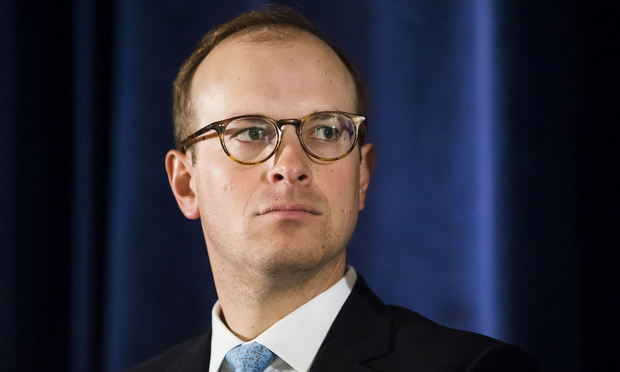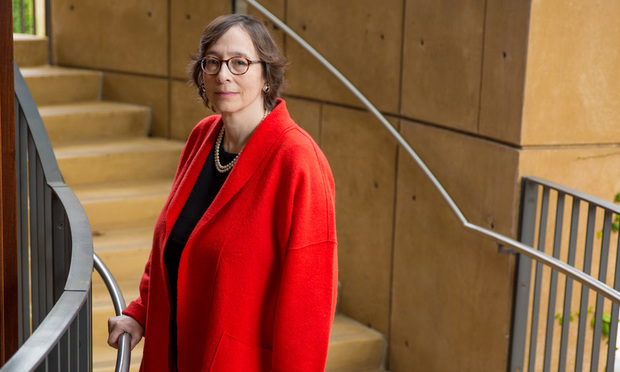Ex-Roberts Clerk Will Argue Against LGBT Workers in New SCOTUS Term
Consovoy McCarthy partner Jeffrey Harris will make his U.S. Supreme Court argument debut in October, arguing that Title VII does not protect against sexual orientation discrimination.
September 18, 2019 at 12:51 PM
5 minute read
The original version of this story was published on National Law Journal
 Jeffrey Harris, a Consovoy McCarthy partner and former associate administrator of the Office of Information and Regulatory Affairs. Photo: Diego M. Radzinschi/ ALM
Jeffrey Harris, a Consovoy McCarthy partner and former associate administrator of the Office of Information and Regulatory Affairs. Photo: Diego M. Radzinschi/ ALM
Consovoy McCarthy partner Jeffrey Harris will make his debut argument next month in the U.S. Supreme Court on behalf of two employers who contend federal civil rights laws do not protect LGBT workers from sexual orientation discrimination.
Harris, who clerked for Chief Justice John Roberts Jr. in the 2008 term, will appear Oct. 8 opposite Pamela Karlan, co-director of Stanford Law's Supreme Court Litigation Clinic. The justices are scheduled to hear the closely watched cases Altitude Express v. Zarda and Bostock v. Clayton County, Georgia.
The two cases concern the scope of protections in Title VII of the Civil Rights Act, which prohibits employers from discriminating because of race, color, religion, national origin and sex. The issue before the justices is whether "because of sex" includes an individual's sexual orientation. The U.S. Court of Appeals for the Second Circuit ruled in the Altitude Express case for broader LGBT protections. The Eleventh Circuit ruled for more limited rights. The Supreme Court that same day will hear a related dispute over whether federal law protections transgender employees from workplace discrimination.
Consovoy McCarthy, an eight-lawyer boutique firm that specializes in constitutional law, appeals and complex litigation, has served as a go-to firm for conservative litigants. Several of the firm's attorneys represent President Donald Trump in various appellate matters challenging the U.S. House of Representatives's subpoenas of Trump's personal financial records. Former Consovoy partner Michael Park was confirmed in May to a seat on the Second Circuit.
In the Supreme Court, Harris's clients—Altitude Express and Clayton County—have agreed to give U.S. Solicitor General Noel Francisco 10 minutes of their 30 minutes of argument time. The Trump Justice Department abandoned the Obama-era argument that Title VII shielded gay, lesbian and transgender workers from discrimination. Trump's Equal Employment Opportunity Commission, however, did not back the Justice Department's arguments in the new Supreme Court cases.
Harris' appearance in one of the new Supreme Court term's highest profile cases will mark his first argument at the Supreme Court lectern. Harris has argued often in the lower federal appeals courts, however. He and partner William Consovoy, a leading attorney for Trump, will be at counsel's table on the first day of the new Supreme Court term as co-counsel to Louisiana in Ramos v. Louisiana, a challenge to non-unanimous juries in criminal cases.
Consovoy McCarthy was neither involved in the briefing of the two Title VII cases nor in any of amicus briefs that were filed in support of, or against, broad civil rights protections for gay, lesbian and transgender workers.
Harris declined to comment on how Consovoy McCarthy was picked to argue in the Title VII case. Lawyers for Altitude Express, represented by Saul Zabell of Zabell & Collotta in New York, and for Clayton County, represented by Jack Hancock of Freeman Mathis & Gary in Georgia, declined to comment about how Consovoy McCarthy was chosen to make the argument next month.
On the other side, Buckley Beal's Brian Sutherland, representing Gerald Bostock, and New York's Gregory Antollino, representing the estate of Donald Zarda, had requested divided argument time from the Supreme Court. They agreed that Stanford's Karlan, a veteran Supreme Court advocate, would argue for their side if the court, as it did, turned down their request for argument time.
 Pamela Karlan of Stanford Law. Photo: Jason Doiy/ ALM
Pamela Karlan of Stanford Law. Photo: Jason Doiy/ ALMTitle VII protections are at the center of a third case being argued the same day as the sexual orientation cases: R.G. and G.R. Harris Funeral Homes v. EEOC and Stephens. In this case, the justices will decide whether federal law bars employers from discriminating because of a person's transgender status or because of sex stereotyping.
The Sixth Circuit ruled in favor of the EEOC and Aimee Stephens, who claims the Michigan funeral home fired her after she made known her intention to transition from a male to female. The Justice Department, without the EEOC's support, has asked the Supreme Court to rule against Stephens.
Francisco, the solicitor general, will share argument time with John Bursch of Alliance Defending Freedom, counsel to the funeral homes. Bursch, a former Michigan solicitor general, will be making his 12th high court argument. He unsuccessfully defended Michigan's same-sex marriage ban in the high court in 2015 in Obergefell v. Hodges.
John Knight, senior staff attorney of the ACLU's LGBT and HIV Project, plans to argue for Stephens in favor of Title VII protection for transgender individuals.
Knight and the ACLU have worked with Stephens since she filed her discrimination claim with the EEOC. They successfully moved to intervene in the Sixth Circuit to protect her interests going forward. The argument, like the one Harris will make in the sexual orientation case, will be Knight's first in the Supreme Court.
Read more:
Consovoy McCarthy Makes an Outsized Mark on Washington
EEOC Doesn't Sign Trump DOJ's Brief Against Transgender Employees
How Stanford's Pamela Karlan Got SCOTUS Argument Time in LGBT Cases
Divided 8th Circuit Revives Videographers' Claims Against Filming Gay Weddings
Record Number of Companies Back LGBT Workplace Rights in SCOTUS Brief
Justices Will Hear Major LGBT Workplace Cases, Testing Title VII's Scope
This content has been archived. It is available through our partners, LexisNexis® and Bloomberg Law.
To view this content, please continue to their sites.
Not a Lexis Subscriber?
Subscribe Now
Not a Bloomberg Law Subscriber?
Subscribe Now
NOT FOR REPRINT
© 2025 ALM Global, LLC, All Rights Reserved. Request academic re-use from www.copyright.com. All other uses, submit a request to [email protected]. For more information visit Asset & Logo Licensing.
You Might Like
View All
Litigators of the Week: A Knockout Blow to Latest FCC Net Neutrality Rules After ‘Loper Bright’

An ‘Indiana Jones Moment’: Mayer Brown’s John Nadolenco and Kelly Kramer on the 10-Year Legal Saga of the Bahia Emerald

Litigators of the Week: A Win for Homeless Veterans On the VA's West LA Campus

'The Most Peculiar Federal Court in the Country' Comes to Berkeley Law
Trending Stories
- 1Pogo Stick Maker Wants Financing Company to Pay $20M After Bailing Out Client
- 2Goldman Sachs Secures Dismissal of Celebrity Manager's Lawsuit Over Failed Deal
- 3Trump Moves to Withdraw Applications to Halt Now-Completed Sentencing
- 4Trump's RTO Mandate May Have Some Gov't Lawyers Polishing Their Resumes
- 5A Judge Is Raising Questions About Docket Rotation
Who Got The Work
J. Brugh Lower of Gibbons has entered an appearance for industrial equipment supplier Devco Corporation in a pending trademark infringement lawsuit. The suit, accusing the defendant of selling knock-off Graco products, was filed Dec. 18 in New Jersey District Court by Rivkin Radler on behalf of Graco Inc. and Graco Minnesota. The case, assigned to U.S. District Judge Zahid N. Quraishi, is 3:24-cv-11294, Graco Inc. et al v. Devco Corporation.
Who Got The Work
Rebecca Maller-Stein and Kent A. Yalowitz of Arnold & Porter Kaye Scholer have entered their appearances for Hanaco Venture Capital and its executives, Lior Prosor and David Frankel, in a pending securities lawsuit. The action, filed on Dec. 24 in New York Southern District Court by Zell, Aron & Co. on behalf of Goldeneye Advisors, accuses the defendants of negligently and fraudulently managing the plaintiff's $1 million investment. The case, assigned to U.S. District Judge Vernon S. Broderick, is 1:24-cv-09918, Goldeneye Advisors, LLC v. Hanaco Venture Capital, Ltd. et al.
Who Got The Work
Attorneys from A&O Shearman has stepped in as defense counsel for Toronto-Dominion Bank and other defendants in a pending securities class action. The suit, filed Dec. 11 in New York Southern District Court by Bleichmar Fonti & Auld, accuses the defendants of concealing the bank's 'pervasive' deficiencies in regards to its compliance with the Bank Secrecy Act and the quality of its anti-money laundering controls. The case, assigned to U.S. District Judge Arun Subramanian, is 1:24-cv-09445, Gonzalez v. The Toronto-Dominion Bank et al.
Who Got The Work
Crown Castle International, a Pennsylvania company providing shared communications infrastructure, has turned to Luke D. Wolf of Gordon Rees Scully Mansukhani to fend off a pending breach-of-contract lawsuit. The court action, filed Nov. 25 in Michigan Eastern District Court by Hooper Hathaway PC on behalf of The Town Residences LLC, accuses Crown Castle of failing to transfer approximately $30,000 in utility payments from T-Mobile in breach of a roof-top lease and assignment agreement. The case, assigned to U.S. District Judge Susan K. Declercq, is 2:24-cv-13131, The Town Residences LLC v. T-Mobile US, Inc. et al.
Who Got The Work
Wilfred P. Coronato and Daniel M. Schwartz of McCarter & English have stepped in as defense counsel to Electrolux Home Products Inc. in a pending product liability lawsuit. The court action, filed Nov. 26 in New York Eastern District Court by Poulos Lopiccolo PC and Nagel Rice LLP on behalf of David Stern, alleges that the defendant's refrigerators’ drawers and shelving repeatedly break and fall apart within months after purchase. The case, assigned to U.S. District Judge Joan M. Azrack, is 2:24-cv-08204, Stern v. Electrolux Home Products, Inc.
Featured Firms
Law Offices of Gary Martin Hays & Associates, P.C.
(470) 294-1674
Law Offices of Mark E. Salomone
(857) 444-6468
Smith & Hassler
(713) 739-1250






